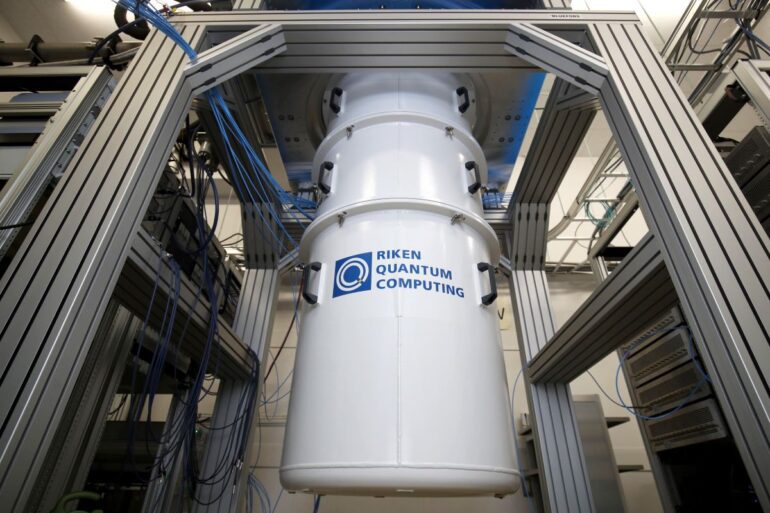TL;DR:
- RIKEN Center for Quantum Computing uses machine learning for quantum error correction.
- Quantum computing’s potential lies in qubits’ superposition ability.
- Quantum error correction is a significant challenge due to environmental disturbances.
- Conventional methods have complexity issues in error correction.
- Machine learning aids in efficient error correction strategies.
- An “autonomous” error correction approach minimizes device complexity.
- Research focuses on “bosonic qubit encodings” for high performance.
- Reinforcement learning optimizes encoding strategies.
- Simplified qubit encoding shows promise in error correction.
- Market implications: Machine learning enhances quantum computing prospects.
Main AI News:
In a groundbreaking development on the horizon of quantum computing, the esteemed RIKEN Center for Quantum Computing has harnessed the formidable power of machine learning. Their mission is to tackle the formidable challenge of quantum error correction, a critical endeavor that could propel quantum computing to the forefront of technology.
Quantum computing has long tantalized the world with its promise to revolutionize computation, thanks to the unique ability of qubits to exist in superpositions. Unlike classical bits, confined to 0 and 1, qubits unlock the potential for groundbreaking operations when combined with quantum entanglement. These capabilities find applications in large-scale searches, optimization problems, and cryptographic pursuits.
The Achilles’ heel of quantum computing, however, lies in the vulnerability of quantum superpositions. Minute disturbances from the ambient environment give rise to errors that erode these delicate quantum states, undermining the very advantage quantum computing offers.
Conventional approaches to quantum error correction have often been thwarted by the immense complexity they impose on quantum devices. Ironically, this complexity has exacerbated the risk of errors, making comprehensive error correction elusive.
Machine learning emerges as a potent ally in the quest for quantum error correction. The RIKEN research team has adroitly employed machine learning techniques to discover error correction strategies that skillfully balance efficiency and efficacy.
Enter the “autonomous” paradigm in quantum error correction, where a meticulously designed artificial environment replaces frequent error-detecting measurements. This innovative strategy aims to minimize the complexity of quantum devices while preserving the robustness of error correction mechanisms.
The research dives into “bosonic qubit encodings,” a promising avenue observed in leading quantum computing platforms anchored in superconducting circuits. The goal is to unearth high-performing encoding schemes within this domain.
Reinforcement learning plays a pivotal role in navigating the intricate landscape of bosonic qubit encodings. In reinforcement learning, an agent interacts with an environment, progressively optimizing its actions—a strategy that proved profoundly effective in this context.
The research bears fruit in the form of an unexpected revelation: a seemingly straightforward, approximate qubit encoding emerges as a leading contender, streamlining device complexity compared to other proposed encodings and exhibiting superior error correction capabilities.
Yexiong Zeng, the pioneering author of the paper, emphasizes the significance of this achievement, stating, “Our work not only illustrates the potential of integrating machine learning into the realm of quantum error correction but may also bring us one step closer to realizing quantum error correction in practical experiments.”
Franco Nori, a distinguished expert in the field, sheds light on the broader implications, remarking that machine learning is poised to play a pivotal role in addressing the grand challenges of large-scale quantum computation and optimization.
This breakthrough by the RIKEN Center for Quantum Computing unveils exciting possibilities for the future of quantum computing. As the research community continues to explore the synergy between machine learning and quantum error correction, we can anticipate further advancements in this dynamic field.
Implementing machine learning into quantum error correction represents a giant leap toward practical quantum computing. The autonomous error correction system and innovative strategies, such as bosonic qubit encodings and reinforcement learning, offer hope in the arduous battle against quantum errors. While challenges persist, the RIKEN research team has illuminated a promising pathway toward a future where quantum computing can shine brightly.
This groundbreaking research not only underscores the immense potential of machine learning within quantum technology but also exemplifies the relentless dedication of the scientific community to push the boundaries of what is achievable in the realm of computing. As this odyssey continues, we eagerly await further developments along the road to unlocking the full potential of quantum computing.
Conclusion:
The integration of machine learning in quantum error correction by the RIKEN Center for Quantum Computing represents a significant advancement. It streamlines error correction processes, making quantum computing more practical and efficient. This development underscores the potential for machine learning to revolutionize the quantum computing market, offering enhanced capabilities and paving the way for broader adoption in various industries.

